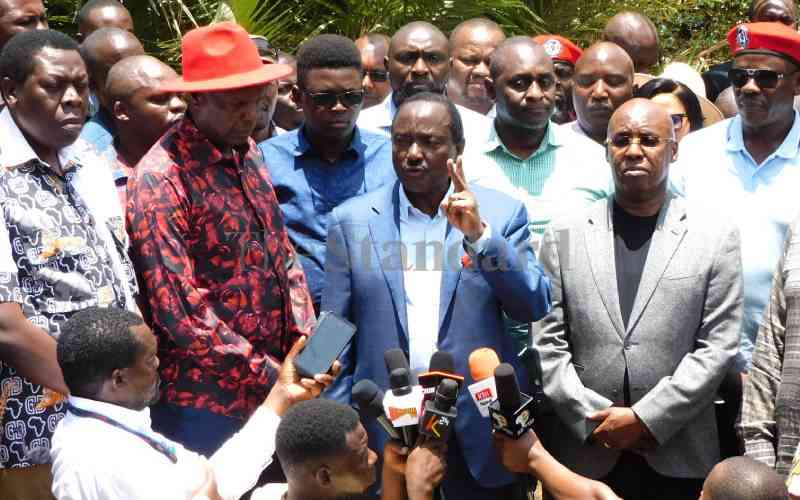Azimio leaders on Sunday cancelled last-minute rallies that had been lined up in Kitengela and Mlolongo. Wiper Party leader Stephen Kalonzo Musyoka said the move to abruptly call off the rallies was reached after consultations following security concerns.
Addressing a press conference at a Kitengela hotel, Kalonzo who was accompanied by Democratic Action Party of Kenya (DAP-K) leader Eugene Wamalwa, Jubilee Secretary General Jeremiah Kioni, former Kiambu governor Ferdinard Waititu, politician Jimmy Wanjigi and Kajiado deputy governor Martin Moshisho, said the presence of police officers in the area meant that the officers were ready to disrupt the rally and course chaos.
"We had earlier planned to attend a Sunday service at the African Inland Church (AIC) Mlolongo but the information we have is that DCI officers has this morning (Sunday) stormed the church and warned the presiding pastor not to allow us there. The same thing has happened at AIC Kitengela church where we intended to attend a service later'' said Kalonzo.
The Wiper leader accused President William Ruto of trying to intimidate those who are against his leadership.
"We are peaceful people, and therefore we don't want to subject the people of Kitengela to chaos and teargas. Our intention is very clear that the people of Kenya are not happy with his leadership, I wonder why they are following us every where we go and for what reason," posed Kalonzo.
The opposition leaders were in the area to to console the Kitengela three - Bob Njagi, Jamil Longton and his brother Longton Aslam - who were allegedly abducted by police and later set free after being held incommunicado for one month.
Kalonzo attributed the abductions to impunity by rogue police officers who he claimed were on a mission to destroy the country’s future. Jamil and his brother Aslam were dumped in Gachie while Njagi was found in Thogoto on the night of September 19.
''We are here to condemn in the strongest terms possible the arrest of the three young men , Bob Njagi, Jamil Longton and his brother Aslam. Although the police denied the act, we are asking who else in Kenya is allowed to have handcuffs, only the police and that's why we hold them accountable for this action,'' said the Wiper boss.
“They are responsible for the attempt to diminish, dismember and destroy our beloved Republic's present and future.” he added.
According to Kalonzo, the acts of abductions were meant to systematically limit, abuse, and silence Kenyans' constitutionally guaranteed rights to free speech.
Following the abhorrible act, Kioni disclosed that the opposition is planning to seek justice at the international level.
"We are going to seek intervention in an international court, we have advised our lawyer Mr Paul Mwangi to start the process,'' said Kioni.
Wamalwa condemned President William Ruto's leadership style claiming the Head of State was in the process of returning the country back to dark days when government critics were taken by the police never to be seen alive.
''We were told that Nyayo chambers were closed, we have now realized that the government has opened other torture chambers in Nairobi and its environs where they hold people incommunicado, starve them almost to death, and when there's pressure from the public they dump them. We are here to condemn that and say we will not sit and watch this again,'' stated Wamalwa. By Peterson Githaiga, The Standard






